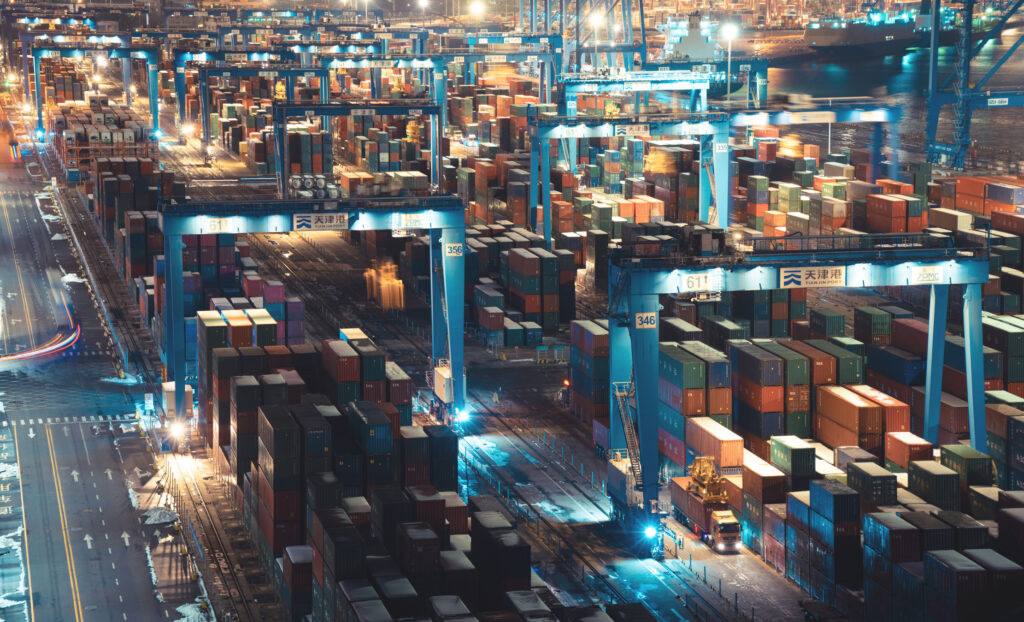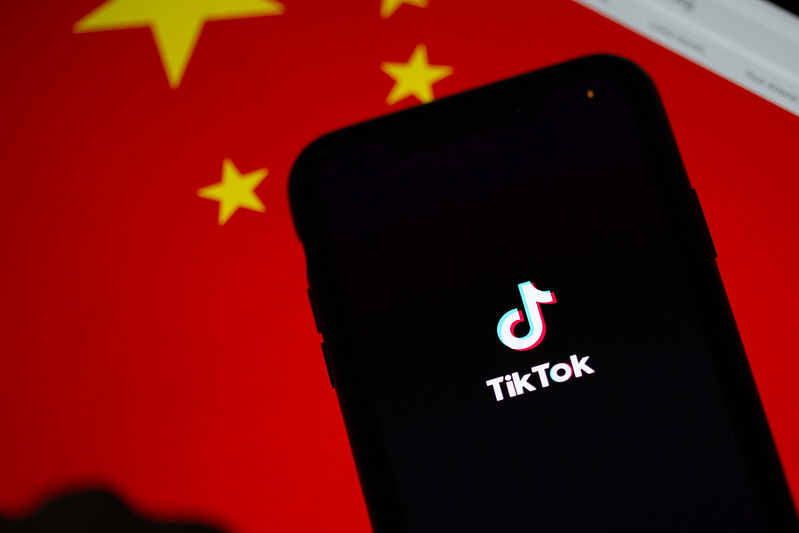
ICAS Bulletin (online ISSN 2836-3418, print ISSN 2836-340X) is published every other week throughout the year at 1919 M St NW, Suite 310, Washington, DC 20036.
The online version of ICAS Bulletin can be found at chinaus-icas.org/bulletins/.

– The U.S. State Department announced the launch of the Office of China Coordination, informally known as ‘China House’, to counter competition with China. The Office of China Coordination looks to “ensure the U.S. government is able to responsibly manage our competition with the People’s Republic of China,” according to Secretary of State Antony Blinken.
– The U.S. State Department’s under secretary for economic growth, energy and the environment is looking for the U.S. to push for more transparency on Chinese loans to African nations.
– The Chinese foreign ministry released a statement around Washington’s U.S.-Africa Leaders Summit: “we firmly oppose using Africa as an arena for great power rivalry and using African strategy as a tool to limit and attack other countries’ cooperation with Africa.”
– Chinese President Xi Jinping traveled to Saudi Arabia looking to use rising tensions between Riyadh and Washington to China’s advantage, ultimately looking to create a “comprehensive strategic partnership.”
– The U.S. State Department is sending a high-level delegation to China to follow up on President Biden’s recent talks with President Xi.
– White House Indo-Pacific Coordinator Kurt Cambell released a statement saying that China seeks stabilized relations with the U.S. while facing “domestic challenges.”
Associated News References:
“U.S. struggles to lure African nations over from China,” Nikkei Asia, December 18 [Paywall]
“US to launch new diplomatic approach to China with ‘China House,’” Al Jazeera, December 16
“US to Push for Transparency on Chinese Loans to African Nations,” Bloomberg, December 15 [Paywall]
“Don’t make Africa a China-US battleground, Beijing says in countdown to Washington summit,” South China Morning Post, December 13 [Paywall]
“With Xi’s trip, China capitalizes on Saudi-U.S. rift,” Nikkei Asia, December 10 [Paywall]
“Senior U.S. delegation to visit China in coming days,” Reuters, December 10 [Paywall]
“U.S. Says China Seeks Stabilized Relations with Washington, in Short Term,” Voice of America, December 8

– The Biden administration has placed 36 Chinese technology firms on a trading blacklist, which would prevent them from purchasing American components.
– For the first time in Chinese history, Beijing allowed for audit records to be taken outside of mainland China with U.S. regulators and the Public Company Accounting Oversight Board.
– Freight shipments from Asia to the U.S. fell 9% year-on-year in October, and freight on U.S.-bound ships from China fell more than 21% on the year; the lowest since May 2020.
– President Xi Jinping’s recent trip to Saudi Arabia brought new trading agreements and a new comprehensive strategic partnership between China and Saudi Arabia. The partnership includes cooperation on hydrogen energy and coordination around Saudi Arabia’s Vision 2030 and China’s Belt and Road Initiative. China also promoted the use of the Chinese yuan as opposed to the U.S. dollar in global energy markets during the visit.
– The U.S. looks to impose sanctions against Russia and China, targeting over 170 Chinese entities for “illegal fishing in the Pacific.”
– The Biden administration has said that Beijing will allow U.S. inspections of Chinese businesses in response to threats of trade blacklisting.
– The Netherlands are planning new controls on the export of chimaking equipment to China, looking to align their efforts with the U.S. in restricting Chinese access to advanced technologies.
Associated News References:
“US puts 3 dozen more Chinese companies on trade blacklist,” Associated Press, December 16
“US regulators complete inspection of US-listed Chinese firms’ audit records, reducing delisting risks” South China Morning Post, December 15 [Paywall]
“China pushes to boost role of yuan in global energy markets as Xi Jinping wraps up Saudi Arabia visit,” South China Morning Post, December 10 [Paywall]
“U.S.-bound container traffic from China plunges as ASEAN share rises,” Nikkei Asia, December 9 [Paywall]
“When China and Saudi Arabia meet, nothing matters more than oil,” CNN, December 9
“U.S. plans sanctions on Russia, China – officials,” Reuters, December 8 [Paywall]
“Beijing allows US export-control checks on Chinese tech companies,” Financial Times, December 7 [Paywall]
“Netherlands Plans Curbs on China Tech Exports in Deal With US,” Bloomberg, December 7 [Paywall]

– The Chinese Foreign Ministry has officially stated that the recent U.S. sanctions on two senior Chinese officials over accused human rights abuses around Tibet are illegal and have harmed bilateral relations.
– During a visit from a senior U.S. delegation to China, led by Assistant Secretary of State Daniel Krittenbrink and Senior Director for China Laura Rosenberger, Beijing has pledged to “properly handle” differences with the U.S. around Taiwan.
– The U.S. has expanded a ban on commercial exports of U.S. technologies that it believes aids Chinese military and hypersonic development programs as well as enables human rights violations.
– The U.S. government placed sanctions on and froze the U.S. assets of senior Chinese government officials in Tibet around alleged torture of Tibetans and against Chinese entities for “illegal fishing operations.”
– The U.S. Department of State has signed off on more than US$425 million in spare aircraft parts to support Taiwan’s fleet. Soon after, the U.S. House of Representatives passed the National Defense Authorization Act, allocating US$10 billion for Taiwan over the next five years.
– The Chinese Defense Ministry has challenged the U.S. China security report, explaining that it condemns the first use of nuclear weapons “at any time and under any circumstances.”
– The U.S. will increase the presence of U.S. forces in Australia, including bomber and fighter jets according to the U.S. Defense Secretary Lloyd Austin. Secretary Austin also looked to “invite Japan to integrate into our force posture initiatives in Australia.”
Associated News References:
“U.S. widens ban on military and surveillance tech sales to China,” The Washington Post, December 15 [Paywall]
“US Sanctions: China slams US sanctions over alleged rights abuses in Tibet,” The Times of India, December 12
“China-US relations: Beijing vows to ‘properly handle’ differences over Taiwan,” South China Morning Post, December 12 [Paywall]
“US sanctions China-based firms over illegal fishing practices,” Al Jazeera, December 9
“US House Passes National Defense Authorization Act, Including $10B for Taiwan,” Voice of America, December 9
“China blasts US report, reiterates ‘no 1st use’ nuke policy,” Associated Press, December 6
“With eye on China, US to boost military forces in Australia–and ‘invite’ Japan to join in,” CNN, December 6
“US approves $425 million in arms sales to Taiwan,” Associated Press, December 6

– Ford Motor Co. and China’s Contemporary Amperex Technology Co. are looking to build a manufacturing plant in Michigan to take advantage of new tax benefits while stepping around U.S.-China tensions.
– Chinese Foreign Minister Wang Yi has urged Seoul to oppose U.S. export controls of advanced technologies to China during a meeting with South Korean counterpart Park Jin.
– The Chinese government is working on a US$143 billion support package for the Chinese semiconductor industry to counter U.S. moves in the vital field.
– China has begun a formal dispute against the U.S. at the World Trade Organization over recent semiconductor export curbs from the Biden administration. The Chinese Ministry of Commerce accused the U.S. of abusing export control measures and obstructing normal international trade operations. The formal dispute and increased tensions in the U.S.-Chinese semiconductor sector came despite initial signs of relief and cooling in recent weeks.
– Google Inc. has refused to replace searches for a Hong Kong protest song with the Chinese national anthem; an action causing Hong Kong’s security chief to express “great regret.”
– Japan has agreed, in principle, with the U.S. and allies to join in on tightening exports of advanced chip making machinery to China.
– Chinese newspapers attacked the investment by the Taiwan Semiconductor Manufacturing Company in Arizona as a “dark turn” in the global semiconductor sector.
Associated News References:
“Ford, China’s CATL Mull Workaround for New US Battery Plant With US-Chinese Tensions High,” Bloomberg, December 15 [Paywall]
“China urges Seoul to oppose US controls on chip exports, resist ‘unilateral bullying,’” South China Morning Post, December 13 [Paywall]
“Exclusive: China readying $143 billion package for its chip firms in face of U.S. curbs,” Reuters, December 13 [Paywall]
“China brings WTO case against U.S. and its sweeping chip export curbs as tech tensions escalate,” CNBC, December 13
“Google refused Hong Kong request over protest anthem – HK official,” Reuters, December 12 [Paywall]
“Japan to Join US Effort to Tighten Chip Exports to China,” Bloomberg, December 12 [Paywall]
“Chinese media calls TSMC’s Arizona fab a ‘dark turn’ for the global chip industry,” South China Morning Post, December 9 [Paywall]
“Tech war: China’s embattled semiconductor sector sees first signs of relief from US sanctions,” South China Morning Post, December 7 [Paywall]

– The U.S. Senate has unanimously passed bipartisan legislation to ban social media app TikTok from U.S. government devices under perceived information-security risks from the app.
– U.S. lawmakers introduced a bipartisan bill to sanction Chinese tech company Huawei and other Chinese 5G companies, looking to restrict them from U.S. banks. U.S. lawmakers claim that Huawei and other Chinese 5G companies engage in economic espionage against the U.S.
– U.S. Senator Marco Rubio announced a separate bipartisan ban on Bytedance’s TikTok, seeking to ban it from public app stores in the U.S. under the “Anti-Social CCP Act.” Two other Senators sent a letter to the Biden administration asking for transparency in negotiations.
– Taiwan’s Ministry of Digital Affairs has restricted Chinese TikTok and other apps, claiming they are “harmful products against national information security.”
– The U.S. states of Texas, Maryland, South Dakota, South Carolina, and Nebraska have banned TikTok on government devices.
Associated News References:
“Republicans Press Biden Officials for Answers on TikTok Security Concerns,” The Wall Street Journal, December 20 [Paywall]
“Senate passes legislation to ban TikTok from US government devices,” CNN, December 15
“U.S. lawmakers introduce bill to restrict Huawei’s access to banks,” Reuters, December 14 [Paywall]
“U.S. lawmakers unveil bipartisan bid to ban China’s TikTok,” Reuters, December 14 [Paywall]
“Taiwan joins US states in limiting TikTok as China’s hit video app faces backlash,” South China Morning Post, December 8 [Paywall]
“Growing number of states banning TikTok on government devices,” CBS News, December 7
“National security concerns reportedly delay TikTok-U.S. deal,” CNBC, December 7
“Russia and China are sharing strategies to undermine Nato, says top US diplomat,” Financial Times, December 20 [Paywall]
“U.S. State Dept says toll of COVID in China a concern for the world,” Reuters, December 19 [Paywall]
“A Visit Inside China’s Desert Rocket Base,” The New York Times, December 16 [Paywall]
“China’s technology, research talent pool large, but ‘not strong enough’, lags behind US,” South China Morning Post, December 16 [Paywall]
“In U.S. Bid to Blunt China’s Pacific Sway, Postal Service Has a Say,” The Wall Street Journal, December 12 [Paywall]
“Most adults in America and China view other side as enemies or unfriendly, suggesting there may be a political pay-off in exploiting tensions,” Business Insider, December 8 [Paywall]
“Shanghai Disneyland Reopens as Businesses in China Welcome Covid-Control Easing,” The Wall Street Journal, December 8 [Paywall]
“US keeps eye on China’s space activities for potential risks,” Associated Press, December 8
“US manufacturers with ties to China applaud easing of Covid-19 restrictions,” South China Morning Post, December 7 [Paywall]
December 15 hosted by Foreign Policy
December 14 hosted by China Research Center
December 12 hosted by Wilson Center
January 12 hosted by Asia Society
January 16 hosted by University of California Berkeley

To our subscribers:
With the end of 2022 around the corner, the Team at ICAS would like to take a moment to thank all of our audience, viewers, readers and subscribers for their support in 2022! We especially thank all of our event speakers and partner institutions who helped make our 2022 lively, far-reaching, and filled with a variety of expert viewpoints.
We look forward to an even more productive and engaging 2023!
Best,
The Institute for China-America Studies
Washington, DC
By Sourabh Gupta
December 19, 2022
China may be the United States’ “most consequential geopolitical challenge”, as per the Joe Biden administration’s recent National Security Strategy, but it is also one of its most globally significant political and economic partners. It is welcome therefore that President Xi Jinping and President Joe Biden were able to initiate a new phase of strategic communication on the sidelines of the G20 Summit in Bali, Indonesia, last month.
In Bali, the two sides re-established a baseline of in-person, leader-led communication, resumed senior official-level dialogue channels, and provided a measure of strategic reassurance to the other side that lowered their respective levels of mistrust. By achieving the intended purpose of having in-depth communication and clarifying both strategic intentions as well as redlines, the two leaders’ meeting has hopefully set a new direction, established a framework, and kicked off a process that will cement a “floor “under their all-important bilateral relationship framework in 2023…
This commentary was originally released on China Daily on December 19, 2022.
By Sourabh Gupta
December 14, 2022
Within two months of the conclusion of the 19th National Party Congress in October 2017, China’s relationship with the United States was thrown into disarray. In December 2017, the Trump administration’s U.S. National Security Strategy labeled China a revisionist rival and formally re-opened the door to great power competition. In Spring 2018, tariffs were unilaterally imposed on China’s exports to the United States. In May 2019, sanctions on tech companies like Huawei landed. Even more recently, the United States enacted the draconian Advanced Computing and Semiconductors export control rule. President Xi alluded to these setbacks in his this year’s 20th Party Congress address when he noted that China had been confronted with “external attempts to blackmail, contain, blockade, and exert maximum pressure.”
It is a measure of the Chinese leadership’s determination not to be distracted by this turn of events that the passage from high-speed growth to high-quality development–rather than geopolitical saber-rattling and security competition–continues to remain the overriding national focus. As President Xi noted in the 20th Party Congress address, to “build a modern socialist country in all respects, [China must] first and foremost, pursue high-quality development … [and that] development [will be the] Party’s top priority in governing and rejuvenating China.” For those who may have expected China would be provoked into fixating on its geopolitical grievances rather than pursue its modernization-related interests, it seems like that phase has yet to come….
This commentary was originally released on ChinaUS Focus on December 14, 2022.
On Friday, December 16, 2022, Senior Fellow Sourabh Gupta was interviewed by China Daily on the U.S.-Africa Summit held in Washington.

The Institute for China-America Studies is an independent nonprofit, nonpartisan research organization dedicated to strengthening the understanding of U.S.-China relations through expert analysis and practical policy solutions.
1919 M St. NW Suite 310,
Washington, DC 20036
icas@chinaus-icas.org
(202) 968-0595
© 2024 INSTITUTE FOR CHINA-AMERICA STUDIES. ALL RIGHTS RESERVED.